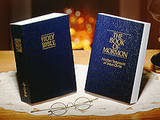
The Book of Mormon, an Inspired Companion to the Bible
by Robert Rosskopf
The Book of Mormon doesn't include the Law, aka the five books of Moses. Nor does it contain a collection of psalms(songs) or proverbs. It does tell of the spiritual experiences and struggles of several faithful men and women throughout Nephite history. It also includes large segments from the Book of Isaiah, as well as a parable from the Book of Zenos.
Although the location of most of the Biblical places are known, the location of most Book of Mormon locals is not known, although there is a ton of speculation. The Book of Mormon is rich in geographical description, such that detailed maps of cities, and their distances from one another, have been made.
Much like the Bible, the Book of Mormon has a ton of Hebraisms - places were the words still follow the rules of Hebraic structure and grammar. Hebrew chiastic verse and other types of Hebrew parallelism also exist. Ancient Hebrew didn't use punctuation, but relied on certain symbols or characters as place markers. The Book of Mormon largely uses the same place markers as the Bible. Thus "it came to pass", which represents one Hebrew word, is used with great repetition in both books.
The prophetic narrative is the same in both books, with prophets seeing visions, and receiving commandments of God, and recording their experiences for posterity. The Book of Mormon opens with a man named Lehi, who is given a vision of God and commanded to preach repentance to the Jews at Jerusalem. It is a matter of historic record that there were multiple prophets who preached repentance and prophesied of destruction in this period, about 600 years before Christ. Speaking against the government was a treasonous offense, so it isn't surprising that Lehi suddenly has to flee for his life. He is led by the Lord, him and his family with him, out of Jerusalem and across the wastes of Arabia, where they eventually end up at the sea shore and build a ship, sailing to America.
The Israelite influence is very strong in the Book of Mormon. There is a strange dichotomy in the Bible between the two nations of Israel and Jerusalem; they have slightly different traditions and laws. The Book of Mormon has almost no obvious Jewish influence, while containing many obvious Israelite influences. This is to be expected, since Lehi is an Israelite, descended from the tribe of Joseph.
The Jews believed that Judah, as the first born, had authority to rule over the House of Israel. The Israelites believed that Joseph, having been separated from his brethren, had been called of God to rule over them. Nephi, the son of Lehi, is chosen by God to rule over his older brethren, but his older brethren will not give up what they consider to be their birth right. So just as Israel split into two nations, the sons of Lehi split into warring factions, the Nephites and the Lamanites. The Nephites mostly just want to live in peace and worship God according to the dictates of their own conscience, but the Lamanites hate the Nephites and are in a constant struggle to either conquer them or destroy them.
Much of the Book of Mormon is written from a military perspective, since Mormon was a military general, as well as a prophet. The Book of Mormon could be used as a field guide for military tactics and guerrilla warfare.
The strong theme throughout the Book of Mormon, is that the righteous will be favored of God.
